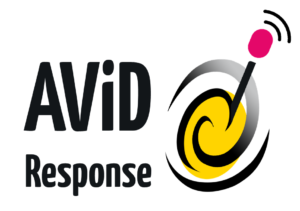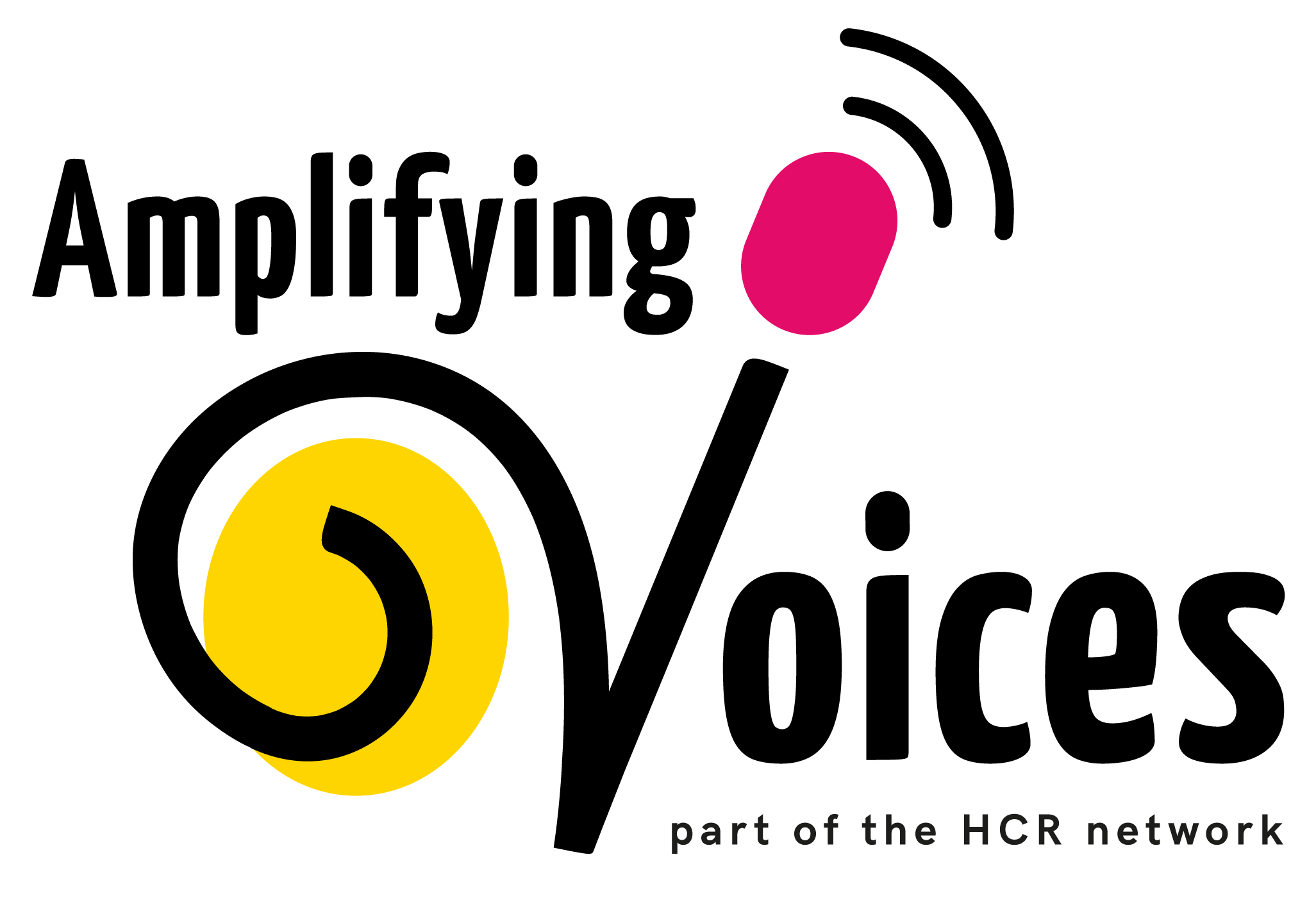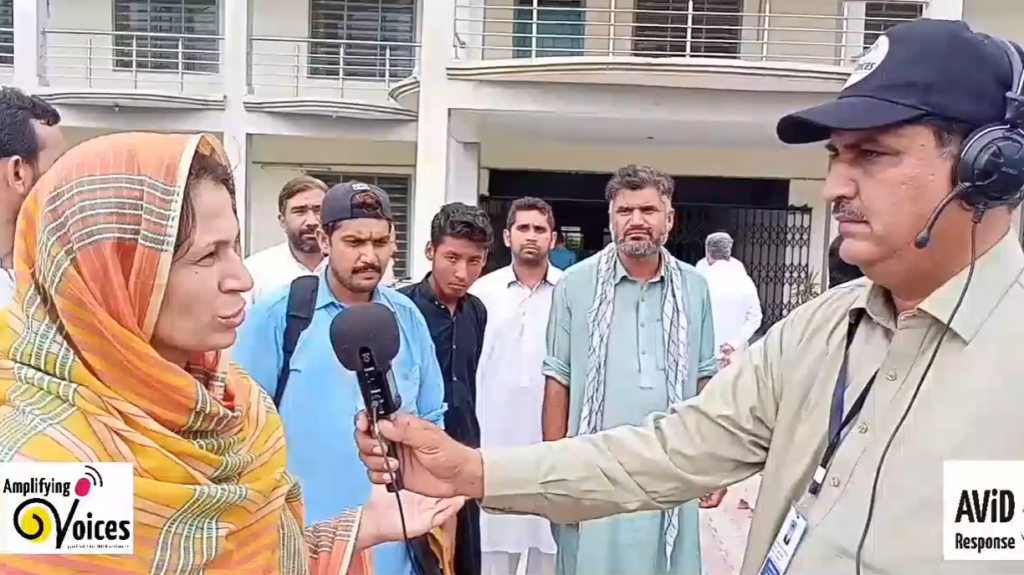
Amplifying Voices in the Pakistan floods
Since June, Pakistan has been devastated by record monsoon rains causing the worst flooding in decades. The provinces of Sindh and Balochistan have been worst hit, but communities where our partners work, in the northern province of Khyberpakhtunkhwa (KPK), have also been badly affected by the floods.
Amplifying Voices Pakistan has responded by supporting these communities near Charsadda and near Nowshera. Hazeen from Amplifying Voices Pakistan told me that private Youtubers and TikTokers did a good job of telling people where to find food and shelter. Amplifying Voices set out to reach people not reached through these channels, to raise the voices of people not reached by aid responders, and to provide access to health advice and basic medical treatment.
Nowshera
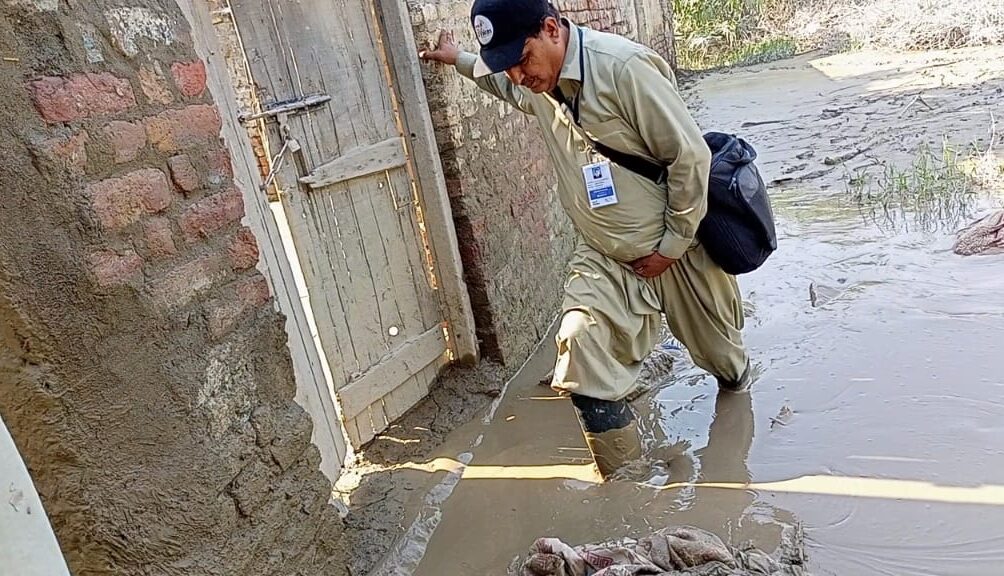
Zafar "gets his shoes dirty" getting out and about to hear community members' stories near Nowshera, Aug 2022.
Zafar, the founder of local partner, Community Media Power, is also Amplifying Voices Pakistan's representative in Nowshera for a new disaster response arm, AViD (Amplifying Voices in Disaster). As the flood warnings started, the local military commander invited Zafar to attend disaster management briefings. This turned out to be vital for accessing up-to-the-minute official information and advice on behalf of the listeners. Zafar also interviewed local government officials including the Additional Deputy Commissioner (see image at top of page) and the Deputy Commissioner. The interviews were recorded and aired on the local station, Zalmay Fm, and also filmed for sending out via Facebook videos. This helped people hear the official advice on evacuation and later, advice on returning to homes after the worst of the flood.
A key aim of the radio response is to help community members take an active role in their own response, so Zafar also visited places where people had taken refuge after fleeing their homes, or where they had missed out on relief, so they could share their stories on air. One place that Zafar visited had had 8ft of water in the houses and 10 days had gone by with no relief arriving. He interviewed community members and made short videos of their situation which he shared on social media platforms connected to local authorities. The next day authorities sent machinery to clean the streets and also provided clean drinking water, food and sprayed the area to prevent disease. One community member said:
"No one would dare to come to our place after seeing such dirt and mud but the AViD team came to us. We will never forget their courage and care for us"
AViD volunteers also provided food packages directly to another group that had missed out on emergency relief.
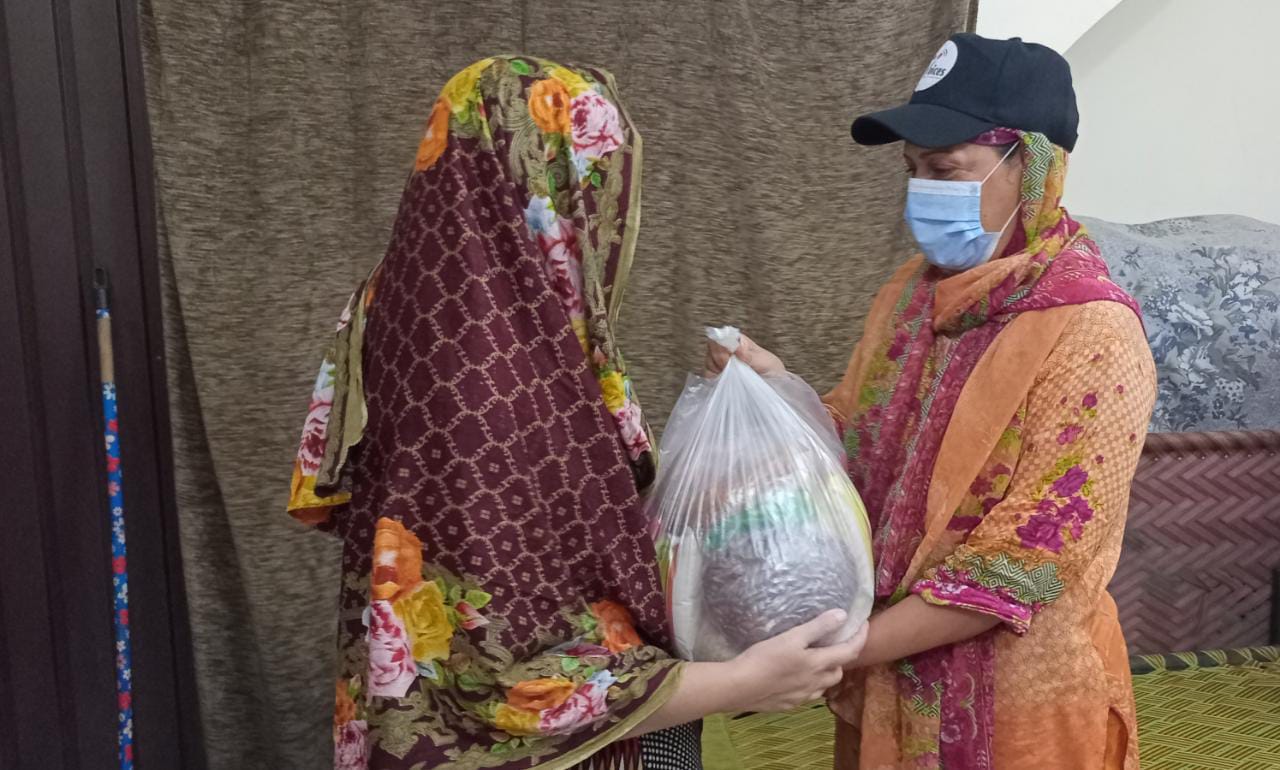
AViD volunteer distributing food packages, nr Nowshera, Aug 2022
Following the initial response, Zafar recorded a series of interviews amplifying the voices of local heroes, such as local firefighters, who had done so much to help their communities.
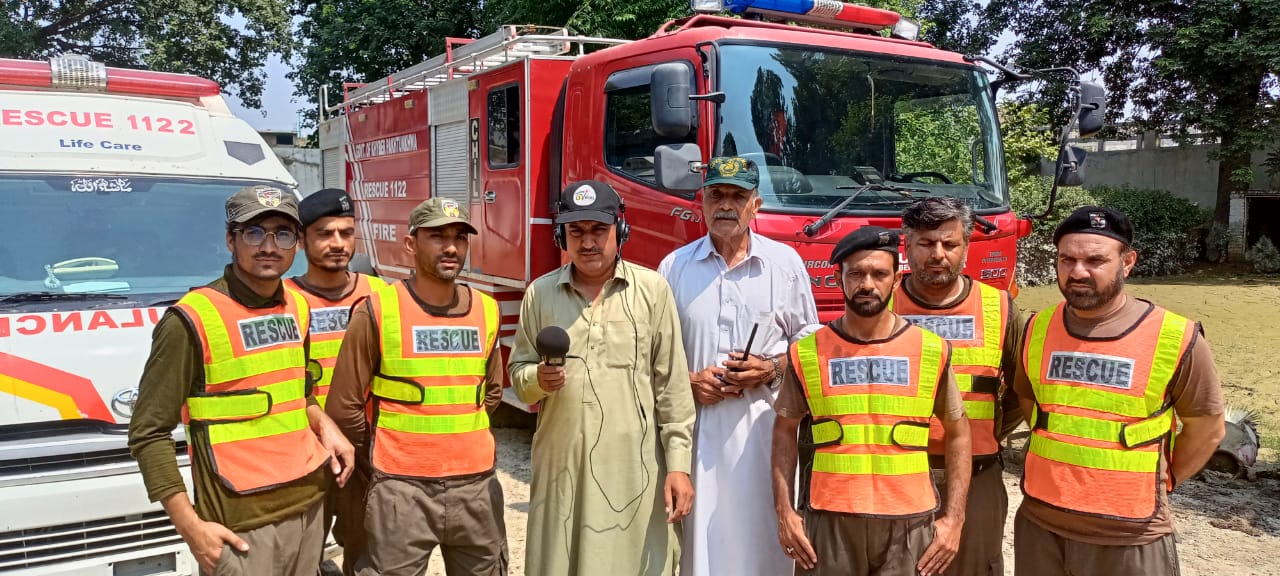
Radio broadcasts to celebrate the local heroes in the Pakistan flood response, Nowshera 2022
Charsadda
In Charsadda district, the compound where the Naway Saher studio is located was flooded. The team leader’s family who live there managed to save a lot of their belongings by moving them, as many families do, to a room on their rooftop before the floods hit. They also managed to save the studio equipment. They then had to evacuate. On returning to the house after the worst of the flood, they found they had a huge clean up job on their hands, but most of their belongings were safe.
The Naway Saher team leader, who is also a local health worker, created radio programmes alerting people to the health risks faced by people returning to flood-damaged homes. We asked him how the children had been affected by the floods. He told us that the children found it exciting, because it was like there was a swimming pool everywhere. But this was also a huge a health risk for the children. Swimming or walking in flood water holds increased risk of snakebites. The water is very dirty and unhygienic, with lots of submerged hazards. Boreholes had been compromised so drinking water was polluted. Amplifying Voices Pakistan provided emergency funding so that Naway Saher was able to record discussions about these challenges with local people and air them on the local radio station, Dilbar FM.
Following the radio programmes Naway Saher and Amplifying Voices Pakistan provided a pop-up health camp with emergency supplies of basic medicines to help people who had become ill because of the flood waters. The Naway Saher team leader and his wife, the ladies health worker for the area, know the people in their community well and were able to prioritise medicines and advice going to those who needed it most.
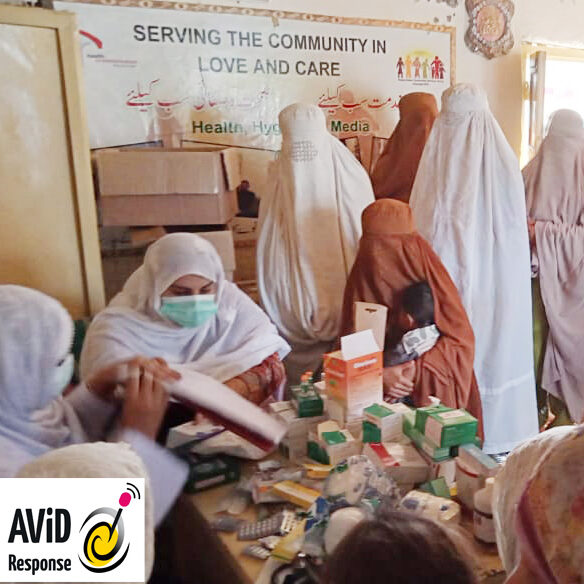
Ladies health worker provides advice and medicine, nr Charsadda, 2022
Despite this, so many people came to get medicine that the supplies ran out within 2 days. The health worker had to move the dispensary from his usual clinic to a local school which had more space for people to queue up. Hazeen encouraged Naway Saher to issue an appeal to raise local support for the medicines. This would supplement the funding given by Amplifying Voices, and followed the principle of supporting local people to take a leading role in their own response.
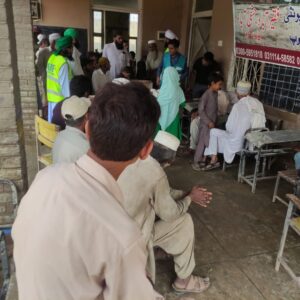
Medical camp in the school
Officials expect the effects of the floods to continue into October and beyond. Teams from Nowshera and Charsadda will continue to provide special radio programmes on flood recovery, with a focus on health care. There will be at least one more health camp in each location to support the need for emergency medicines. An emergency response like this falls outside the budgets and plans for Amplifying Voices Pakistan, so we are grateful to our supporters who can give a little extra to support Hazeen and his team in this time. We are also grateful to FEBC Australia for their generous support of this response.
Amplifying Voices in Disaster (AViD)
This was the first deployment of an Amplifying Voices in Disaster (AViD) response. AViD, is a concept that Amplifying Voices UK and Amplifying Voices Pakistan been working on together in preparation for such an event. AViD builds on our previous experience supporting First Response Radio, using radio programmes and other media to provide timely 2-way communication channels for local communities affected by a disaster. AViD’s goal is for community voices to play a central role in humanitarian responses, so that communities recover quickly from disaster, growing in confidence, capacity, and resilience as they do so.
We feel that Amplifying Voices can be most effective in disaster response by working with existing community-centred media projects where trust already exists between our partners and community members. This provides a strong foundation for supporting the affected community by creating media programmes with community voices at the fore.
AViD also equips community groups to liaise with the influx of humanitarian service providers who come into disaster-affected communities often with quite specialised information and advice to communicate. To equip ourselves for the task and to build understanding with humanitarian service providers, we are members of the CDAC Network. The CDAC Network is a global alliance of media development organisations, UN agencies, the Red Cross/Red Crescent Movement, NGOs and specialist communications entities, all determined to enable and support dialogue with and between communities in preparation for, or response to disasters.
